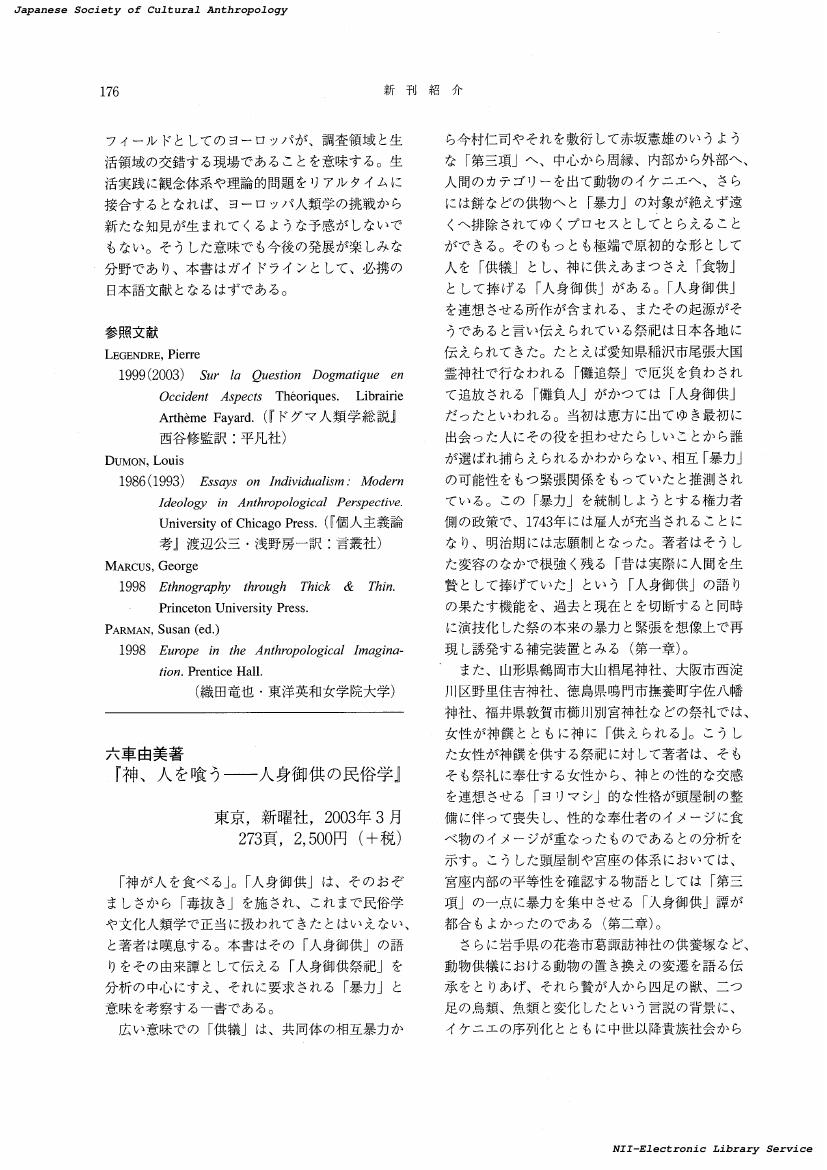15 0 0 0 IR ウガンダ東部パドラにおける「災因論」の民族誌 : 死霊と憑依、毒そして呪詛の観念(1)
- 著者
- 梅屋 潔
- 出版者
- 神戸大学大学院国際文化学研究科
- 雑誌
- 国際文化学研究 : 神戸大学大学院国際文化学研究科紀要 (ISSN:13405217)
- 巻号頁・発行日
- no.47, pp.25-49, 2016-12
- 著者
- 梅屋 潔
- 出版者
- 東北学院大学人間情報学研究所
- 雑誌
- 人間情報学研究 (ISSN:13419811)
- 巻号頁・発行日
- vol.12, pp.17-39, 2007
8 0 0 0 IR 「伝統」を逆照射する : ウガンダ東部パドラにおける聖霊派キリスト教会の指導者たち
- 著者
- 梅屋 潔
- 出版者
- 神戸大学近代発行会
- 雑誌
- 近代 (ISSN:02872315)
- 巻号頁・発行日
- no.115, pp.1-43, 2016-12
- 著者
- 梅屋 潔
- 出版者
- 日本文化人類学会
- 雑誌
- 文化人類学 (ISSN:13490648)
- 巻号頁・発行日
- vol.83, no.2, pp.274-284, 2018
<p>This paper argues the effectiveness of a strategy by President Museveni's campaign for reelection to conduct a series of government re-burials of or commemorative ceremonies for great men with West Nilotic origin who had been murdered by then-President Idi Amin. The attempt is to describe the attitude of the Western Nilotic peoples in Uganda towards a series of events, and to confirm how individuals with voting rights are inseparably connected to the identity and sentiments of their ethnic group. The re-burials clearly show that modern presidential elections in Uganda have an emotional aspect as well as a civic one. The series of events, and the strategic effectiveness displayed, force us to rethink the universality of the idea of the concept of "citizenship." That concept—as with all concepts of Western origin believed to be universal—has been interpreted and appropriated reasonably within an autochthonous cosmogony, and might be seen to be interwoven with autochthonous concepts in Africa and other areas after being imported from the West.</p><p>Because of the series of events, the people of Western Nilotic origin, or at least those who can assert to have some connection, supported President Museveni as he honored the great dead men of their ethnicity. This time, the reburial was an epoch-making strategy to address the issue, and even successfully managed to integrate people based on their ethnicity, even though the late Oboth-Ofumbi was not especially beloved by all his neighbors. Another issue was the role of religious and spiritual dimensions in peopleʼs voting behavior. The government's honoring of the dead positively affected people in neighboring communities. It can be said that the dead thus demonstrated agency to the living, having intervened in the actions of the living. In a sense, they—ontologically, the dead—shared a social space with the living in terms of personhood, which, for people of Western Nilotic origin, inevitably includes those who have already died. A consideration of the state of the dead can thus greatly influence their voting behavior.</p><p>(View PDF for the rest of the abstract.)</p>
- 著者
- 梅屋 潔
- 出版者
- 日本文化人類学会
- 雑誌
- 民族學研究 (ISSN:00215023)
- 巻号頁・発行日
- vol.59, no.4, pp.342-365, 1995-03
新潟県佐渡島の人々の間では,ムジナ(貉(ムジナ))ないしトンチボ(頓智坊)と呼ばれる動物がしばしば話題に上る。この動物は動物でありながら神であり,ときに人間にも変身する存在として知られている。ところが,注意深くこの概念を巡る語りをみてみると,その意味が極めて同定し難いことがわかる。われわれからみると明らかに異質な存在が,同じものであるかのように「あたりまえ」のものとして語られるのである。本稿の目的は,そのムジナについての語りの分析を通じて,従来人類学者が「象徴」という概念を用いる衝動に駆られるとき,いったいなにが起きているのか,また,語りの中でそのような概念の果たしている役割は何か,という問いに答えようとするものである。「あたりまえ」と考えられていることを相対化し,考察するために,従来の中間的話体に加えて,テキストの微視的な分析を行うことにより,われわれ,そしてかれらの中で起こっているコンテキストのくむかえや矛盾の無視などが明らかにされる。
- 著者
- 梅屋 潔
- 出版者
- 日本文化人類学会
- 雑誌
- 文化人類学 (ISSN:13490648)
- 巻号頁・発行日
- vol.69, no.1, pp.176-177, 2004
3 0 0 0 OA 「象徴」概念は「合理的」に埋葬されうるか? : 新潟県佐渡郡の貉(むじな)信仰から
- 著者
- 梅屋 潔
- 出版者
- 日本文化人類学会
- 雑誌
- 民族學研究 (ISSN:24240508)
- 巻号頁・発行日
- vol.59, no.4, pp.342-365, 1995 (Released:2018-03-27)
新潟県佐渡島の人々の間では,ムジナ(貉(ムジナ))ないしトンチボ(頓智坊)と呼ばれる動物がしばしば話題に上る。この動物は動物でありながら神であり,ときに人間にも変身する存在として知られている。ところが,注意深くこの概念を巡る語りをみてみると,その意味が極めて同定し難いことがわかる。われわれからみると明らかに異質な存在が,同じものであるかのように「あたりまえ」のものとして語られるのである。本稿の目的は,そのムジナについての語りの分析を通じて,従来人類学者が「象徴」という概念を用いる衝動に駆られるとき,いったいなにが起きているのか,また,語りの中でそのような概念の果たしている役割は何か,という問いに答えようとするものである。「あたりまえ」と考えられていることを相対化し,考察するために,従来の中間的話体に加えて,テキストの微視的な分析を行うことにより,われわれ,そしてかれらの中で起こっているコンテキストのくむかえや矛盾の無視などが明らかにされる。
3 0 0 0 IR ウガンダ東部パドラにおける「災因論」の民族誌 : 死霊と憑依、毒そして呪詛の観念(2)
- 著者
- 梅屋 潔
- 出版者
- 神戸大学大学院国際文化学研究科
- 雑誌
- 国際文化学研究 : 神戸大学大学院国際文化学研究科紀要 (ISSN:13405217)
- 巻号頁・発行日
- no.48, pp.77-109, 2017-07
- 著者
- ニャムンジョ フランシス・B 梅屋 潔
- 出版者
- 岩波書店
- 雑誌
- 思想 (ISSN:03862755)
- 巻号頁・発行日
- no.1120, pp.99-127, 2017-08
2 0 0 0 OA 地域調査報告 気仙沼市における無形民俗文化財の調査記録(1)
- 著者
- 相澤 卓郎 齋藤 良治 土取 俊輝 梅屋 潔
- 出版者
- 東北学院大学教養学部地域構想学科
- 雑誌
- 地域構想学研究教育報告 = Study and education of regional design (ISSN:21868875)
- 巻号頁・発行日
- no.4, pp.22-40, 2013
2 0 0 0 IR ルスワ(luswa) : ウガンダ東部パドラにおけるインセスト・タブー
- 著者
- 梅屋 潔
- 出版者
- 神戸大学大学院国際文化学研究科
- 雑誌
- 国際文化学研究 : 神戸大学大学院国際文化学研究科紀要 (ISSN:13405217)
- 巻号頁・発行日
- no.49, pp.1-22, 2017-12
- 著者
- 梅屋 潔
- 出版者
- 日本文化人類学会
- 雑誌
- 文化人類学 (ISSN:13490648)
- 巻号頁・発行日
- vol.69, no.1, pp.176-177, 2004-06-30 (Released:2017-09-28)
1 0 0 0 IR 「化かされる」という経験(こと)--あるいは人類学的実践についての覚書き
- 著者
- 梅屋 潔
- 出版者
- 慶應義塾大学大学院社会学研究科
- 雑誌
- 慶応義塾大学大学院社会学研究科紀要 (ISSN:0912456X)
- 巻号頁・発行日
- no.38, pp.p81-92, 1993
はじめに1. 「トンチボ」2. 「一見して非合理な信念」?3. 「真理」の代価4. 「説明体系」モデルを適用する際の留意点5. 「解釈の終着点」?おわりに論文
- 著者
- 梅屋 潔
- 出版者
- 日本社会学会 ; 1950-
- 雑誌
- 社会学評論 = Japanese sociological review (ISSN:00215414)
- 巻号頁・発行日
- vol.70, no.1, pp.77-79, 2019
- 著者
- 梅屋 潔
- 出版者
- 日本文化人類学会
- 雑誌
- 文化人類学 (ISSN:13490648)
- 巻号頁・発行日
- vol.77, no.2, pp.319-322, 2012-09-30 (Released:2017-04-10)
- 著者
- 梅屋 潔
- 出版者
- 岩波書店
- 雑誌
- 思想 (ISSN:03862755)
- 巻号頁・発行日
- no.1120, pp.86-98, 2017-08
1 0 0 0 元祖ツイッター、渡邊欣雄さんのつぶやきとあしあと
- 著者
- 梅屋 潔
- 出版者
- 人間社
- 雑誌
- アリーナ = Arena (ISSN:13490435)
- 巻号頁・発行日
- no.14, pp.495-504, 2012
- 著者
- 梅屋 潔
- 出版者
- 日本宗教学会
- 雑誌
- 宗教研究 (ISSN:03873293)
- 巻号頁・発行日
- vol.87, no.1, pp.198-204, 2013
1 0 0 0 OA 現代アフリカにおける独裁者の虚像と実像に関する民族学的研究
本調査研究の目的は、現代アフリカにおける独裁者の虚像と実像に関する民族学的研究という研究課題のもとに、(1)軍事独裁、2)一党独裁(3)個人独裁という3つの政権の実態があることを探究することである。現代アフリカの7カ国、6独裁者(為政者)について現地調査を実施した。具体的には、ンクルマ(ガーナ)、セク・トゥーレ(ギニア)、ケニヤッタ(ケニア)、ニエレレ(タンザニア)、アミン(ウガンダ)、モブツ(コンゴ)である。本調査研究は、権威主義的政権及び指導者を探究することによって、通時的、共時的な独裁の包括的分析を提示した。

